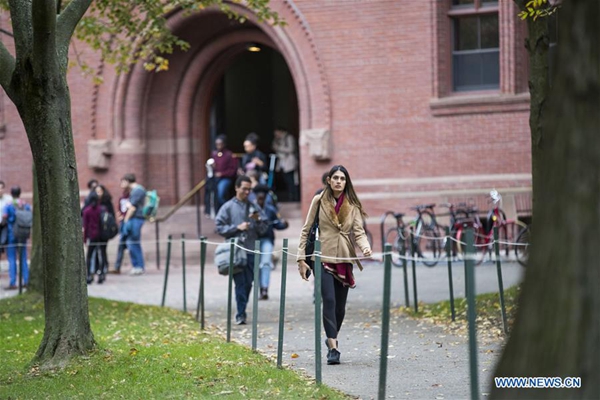
Students walk on the campus of the Harvard University in Cambridge of Massachusetts, the United States, on Oct. 15, 2018. [Photo/Xinhua]
In the latest development in the education sector's response to the COVID-19 global epidemic, it has been reported that both Harvard University and the Massachusetts Institute of Technology are attempting to challenge the Trump administration's policy barring many foreign students from staying in the U.S. if their host university is not planning to hold in-person classes this autumn.
Harvard is only planning for online classes, while MIT will offer mostly online classes, with a very few selected ones adopting a hybrid approach of online and in-person classes.
Their federal lawsuit involves seeking a temporary restraining order and then a permanent injunction to prevent the Department of Homeland Security (DHS) and the United States Immigration and Customs Enforcement (ICE) from changing the visa status of international students. Several other universities and colleges have now joined the suit.
They argue that such sudden move would leave many international students with no educational options within the United States just weeks before the commencement of the new semester. It is also impossible and impracticable for many of these students to return to their own home countries to participate in online learning and teaching, not to mention the potential costs and danger throughout the ever-evolving epidemic environment.
Throughout the years, the United States has continued to strive to attract the most talented and motivated students from all over the world, making it a hub of international education and student exchange. These human talents have undeniably contributed to its rapid economic development and a sense of pluralistic cultural hybridity.
Many international students worry that their existing and potential research and scholarship will be jeopardized if they are forced to return home. The journey back to the United States also looks almost impossible for some, as there are no scheduled flights while lockdown continues across the world.
It is undeniable that the wide spread of the coronavirus has already led to a sharp drop of student numbers across many universities. Trump's new policy would certainly further exacerbate the depressing situation. Some even claim his decision is a political one as the presidential election is fast approaching.
Their concern is that the move will further perpetuate the anti-immigrant discourse, which hinders the country from embracing diversity. This is apparent when more students have started exploring opportunities in other countries, leading to a major brain drain.
Nonetheless, the more immediate concern is that university campuses can become coronavirus clusters, especially when the epidemic situation is still severe and even deteriorating in many parts of the world.
That said, universities should now make good use of their abilities and experience in issuing various protocols and implementing hybrid infection control measures to reduce individual contact and exposure when it comes to resuming some face-to-face teaching.
The overarching principle is that sufficient and detailed guidance should be offered by every university. This helps reduce the confusion and uncertainty as much as possible as schools look for ways to reopen safely.
Naturally, all measures should be fully aligned with the safety and interests of students. Admittedly, contingency plans and special exceptions should be granted in case a sudden fresh outbreak forces the universities to switch to entirely online teaching again.
Although these general rules are always effective in safeguarding public health, every university has its unique context that can hardly be covered purely by generic guidelines. Schools should always be given flexibility and autonomy to come up with their own learning and teaching arrangements. They can make a gradual and partial return to face-to-face teaching rather than have a top-down policy forced on them.
Of course, there are many teachers who are more than capable of offering high-quality and rigorous teaching via the online medium.
That said, the real-life classroom is still a vital part of education. Regardless of how sophisticated and innovative online teaching may be, there are certainly some elements that can barely be replaced in a virtual setting, especially for some professional programs that involve laboratories, studios, and clinical work.
While we are always eager to see immediate and visible impact on student learning and teaching in this critical period, we should always be cautious about any policy that claims to change things overnight. The feasibility of any policy depends on many intriguing factors like readiness of stakeholders, physical conditions across universities, as well as other systemic features and constraints.
Regardless of what learning and teaching mode we adopt, the fundamental importance of creating diverse learning opportunities and a conducive learning environment should never be undermined. This is also a precious opportunity for all teachers empowering themselves the ownership of enacting, reflecting, examining, and changing their underlying learning and teaching beliefs as change agents and innovation designers.
Both the World Health Organization and many health experts have reiterated the fact that the coronavirus cannot be eliminated before effective treatment and vaccination are fully available.
As the world is gradually entering the new normal, the focus should be how to strike a balance in safeguarding public health and maintaining daily operation. In the case of education, the interest of students should always be the top priority.
Mathew Wong is an assistant professor in the Department of Social Sciences at the Education University of Hong Kong.
Opinion articles reflect the views of their authors only, not necessarily those of China.org.cn.
If you would like to contribute, please contact us at opinion@china.org.cn.




